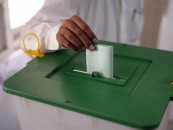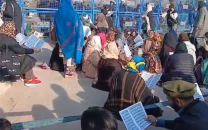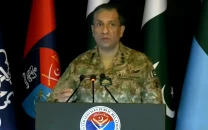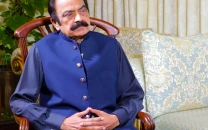Latif Khosa delivers PTI founder’s letter to CJP
Imran asks CJP Afridi to allow communication with children, pleads Bushra Bibi case

PTI leader Sardar Latif Khosa handed a letter from Pakistan Tehreek-e-Insaf (PTI) founder Imran Khan to Chief Justice of Pakistan (CJP) Yahya Afridi on Thursday and raised concerns over ongoing cases, prison conditions, and judicial practices, said Latif Khosa.
Speaking to reporters after the meeting, Khosa said the CJP “listened calmly” as he detailed the lack of hearings in PTI-related cases and the “bulldozing” of trials. He described the PTI founder as being held in a 9-by-11-foot cell and said both the founder and his wife were facing hardships in jail.
Khosa said he informed the CJP about restrictions on private meetings with family members and shared input on prison reforms, noting that the PTI founder was asked to provide written suggestions.
The chief justice, he added, pledged to create a uniform policy on prison conditions and affirmed his oath to uphold fundamental rights.
Khosa also criticised invasive searches of lawyers at courts and described “turmoil” in the high court. He said he reminded the chief justice that, as the “father of the judiciary,” he must fulfil his responsibilities within constitutional limits.
Earlier in the day, Aleema Khan entered the Supreme Court (SC) carrying a letter from PTI’s imprisoned founder. “We want to deliver the PTI founder’s letter to the Chief Justice of the Supreme Court,” said lawyer Latif Khosa. Police stopped her, stating that permission was required to proceed beyond that point—permission Imran Khan’s sisters did not have.
The letter was a plea to the chief Justice, an appeal to "uphold the oath of your office and show the people that the Supreme Court of Pakistan remains their final refuge of justice."
Imran details the conditions in which he has now spent over 772 days, due to over 300 cases filed against him. His first grievance is the way he has been ostracised, mentioning how his sons can not visit him or speak to him on the phone.
He voices his concerns regarding the imprisonment of his wife, Bushra Bibi, claiming that her only crime is that "she's my wife." Khan details the solitary circumstances of Bushra Bibi's imprisonment, how all verticals of communications have been stripped from her.
The deteriorating nature of her health is brought forth, and the injustice that surrounds it. "Her doctor is barred from examining her, let alone providing her any treatment. Pakistani law expressly grants women special concessions for bail, solely owing to their gender."
Multiple reports have contested the nature of Bushra Bibi's complaints. A report was released in April of this year detailing the jail conditions of Bushra Bibi's imprisonment. The report stated that Bushra Bibi receives regular health monitoring and has access to a dedicated kitchen space within the jail.
Read: Imran’s arrest spells chaos
The imprisonment of PTI workers following the May 9 protests has established a contentious reputation for themselves. Not just for the way the trials have been conducted, with the newly established practice of trying civilians in military courts, but also for the nature of the way arrests proceeded.
In December of 2024, without assigning any legal reasoning, the Constitutional Bench (CB) of the Supreme Court had conditionally allowed military courts to announce their verdicts in 85 cases of civilians who are in the army's custody on charges of attacking military installations on May 9, 2023.
Imran challenges the conditions under which the arrests were conducted, "Many were abducted, beaten, and subjected to military trials in flagrant violation of constitutional protections."
Imran lists cases and sentences of family members he believes prove the "unprecedented victimisation of my family." The incident of Barrister Hassan Niazi's arrest, his sentence of 10 years made an example. Imran's sisters, who have been booked in dozens of cases and his nephews Shahrez and Shershah, both of whom are currently in prison, provided as evidence.
The 26th Constitutional Amendment
One of the poignant remarks of Imran's letters is his detailed objection to the 26th Constitutional Amendment, which Imran believes "has been used as a tool to sanctify this electoral dacoity, while petitions challenging it lie unheard in your court."
The 26th Amendment to Pakistan's Constitution, enacted in October 2024, introduced significant changes to the judiciary's structure and appointment processes.
Notably, it altered the selection method for the Chief Justice of Pakistan, shifting this responsibility from a seniority-based system to a nomination by a Special Parliamentary Committee from among the three most senior Supreme Court judges, with a fixed term of three years.
Supporters of the amendment, including the ruling coalition led by Prime Minister Shehbaz Sharif, argue that these changes are necessary to curb judicial overreach and restore balance among the branches of government.
They assert that past judicial decisions have undermined democratic processes, and this amendment seeks to reinforce parliamentary sovereignty.
Read more: Civil society, activists move Supreme Court against 26th Amendment
Opposition parties, particularly the Pakistan Tehreek-e-Insaf (PTI), have labeled the amendment as an effort to weaken the judiciary.
They argue that it allows the executive to exert undue influence over the judiciary, compromising its ability to act as a check on governmental power. The PTI criticized the amendment's passage, calling it a "black day" in Pakistan's constitutional history.
The PTI founder raised concerns regarding Islamabad High Court (IHC) Chief Justice Sarfraz Dogar's handling of Imran's case. Imran accused the Judge of "deliberately refusing to fix my Al-Qadir trust petitions and the Toshakhana Revisions Petitions."
Imran's letter adopts a somber tone when he refers to the case of Zulfikar Ali Bhutto, reminding the reader of the verdict by the Supreme Court in 2024, stating "that fair trial and due process requirements were not met. Justice in its truest sense must happen in real time, pyrrhic justice occurs 44 years later."
The letter concludes with the petitioners' demands, "allow telephone calls to my sons as mandated by the Jail Manaua. Grant access to Bushra Bibi's doctor for her medical treatment, and ultimately restore judicial independence of the judiciary in Pakistan."




















COMMENTS (2)
Comments are moderated and generally will be posted if they are on-topic and not abusive.
For more information, please see our Comments FAQ